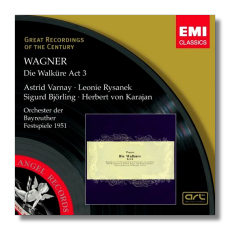
The Internet's Premier Classical Music Source
Related Links
- Wagner Reviews
- Latest Reviews
- More Reviews
-
By Composer
-
Collections
DVD & Blu-ray
Books
Concert Reviews
Articles/Interviews
Software
Audio
Search Amazon
Recommended Links
Site News
 CD Review
CD Review
Richard Wagner
Die Walküre, Act Three

- Astrid Varnay (Brünnhilde)
- Leonie Rysanek (Sieglinde)
- Sigurd Björling (Wotan)
- Brünnhild Friedland (Gerhilde)
- Lieselotte Thomamüller (Helmwige)
- Elfriede Wild (Waltraute)
- Ruth Siewert (Schwertleite)
- Eleanor Lausch (Ortlinde)
- Hertha Töpper (Siegrune)
- Ira Malaniuk (Grimgerde)
- Hanna Ludwig (Rossweise)
Bayreuth Festival Orchestra, 1951/Herbert von Karajan
EMI Classics 380022-2 ADD monaural 68:01
Those of us who are not devout Wagnerians still like to stick our feet in the water from time to time. If you quail at the thought of sitting through all of Die Walküre (which is not even the longest opera in the Ring cycle), then you might try at least an act of it. Although Act One from the same opera probably is an easier sell (those nice arias for Siegmund and Sieglinde!), Act Three is even shorter. Furthermore, it starts with the Ride of the Valkyries, ends with the Magic Fire Music, and has Wotan's Farewell between the two. That's digestible.
Furthermore, there are a couple of recordings of Act Three all by itself. (It fits neatly on a single CD, if the conductor doesn't dawdle.) One conducted by Sir Georg Solti in 1957 is a classic, not least because it features Kirsten Flagstad as Brünnhilde. (This was something of a warm-up for Solti's complete recording of the four Ring operas a few years later.) The one reviewed here, unlike Solti's, is not in stereo, but it documents a historic occasion, so allowances should be made. This is the "first-ever live recording to be issued of a whole act of an opera at Bayreuth." (Phew, a lot of qualifiers there.) After a hiatus caused by the war, the Bayreuth Festival reopened in the summer of 1951, with Wilhelm Furtwängler conducting Beethoven's Ninth Symphony. (There's an EMI recording of that performance as well.) Plans to record a complete Ring that year went awry, but at least we have this document of Varnay and Rysanek rocking the house, with galvanizing conducting from Herbert von Karajan, who made few appearances in Bayreuth after this.
You can't miss the electricity in the air; no studio performance sounds like this. True, there's some clomping around on stage, and the recording quality lacks clarity at times, but these faults are easy to forget when you hear singing as committed as this. I find Varnay to be a more womanly Brünnhilde than Birgit Nilsson, and in 1951, Varnay's voice was comparable to (if not better than) Nilsson's at her best. Rysanek was just 24 when she sang this Sieglinde, and the freshness and excitement of her singing are unmatched. Sigurd Björling's Wotan has a tendency to bark, when he can't produce the volume he wants, and he is less convincing in portraying Wotan's anger than his love for Brünnhilde, but parts of his Farewell are very touching. The Valkyries are exciting and well-disciplined. Karajan conducts with sensitivity and an ear for detail. Later in his career, his performances had a tendency to be too self-regarding. Here, he is at the service of the music.
The booklet contains a brief but newly-written appreciative essay by Richard Osborne, and a full German libretto, with an English translation. That's a happy surprise, and will make this "Great Recordings of the Century" reissue attractive to almost everyone.
Copyright © 2007, Raymond Tuttle




















